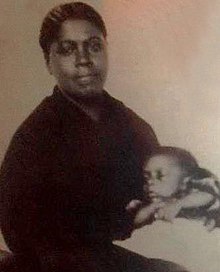Henrietta Duterte

Henrietta Duterte (1817 – December 23, 1903) was an African-American funeral home owner, philanthropist, and abolitionist from Philadelphia, Pennsylvania. She was the first American woman to own a mortuary, and her business operated as a stop on the Underground Railroad.[1][2]
Biography
Henrietta Duterte (née Bowers) was born to an affluent, free black family and raised in Philadelphia's Seventh Ward, which was popularized by its inclusion in W.E.B. DuBois' The Philadelphia Negro, the first-ever sociological study of a black American community. She was one of 13 children, including entrepreneur, organist, and abolitionist John C. Bowers, and Thomas Bowers, a renowned opera singer known as "The Colored Mario."[3][4] Known for her fashionable attire, she began her career as a tailor. In 1852 she married Francis A. Duterte, a Haitian-American owner of an undertaking business. Tragically, none of their children survived infancy and Francis died in 1858.[1]
After her husband's passing, Henrietta took over the funeral parlor and became the first American woman to operate such a business.[3][5] The funeral home earned a reputation for quick undertaking service, which was necessary in the time before modern-day embalming methods. The business was estimated to gross $8,000/year (about $211,500 as of 2017) under her ownership.[1]
Duterte was a member of the Underground Railroad, and used her business to assist fugitive slaves from southern states seeking freedom in the North. She often hid runaway slaves in coffins or disguised them as part of funeral processions.[3][6] In addition, the success of the funeral parlor allowed her to make generous contributions to her community, and she supported the AME Church of St. Thomas, the Philadelphia Home for Aged and Infirm Colored Persons, and the Freedman's Aid Society, which was created after the Civil War to provide assistance to formerly enslaved people in Tennessee.[1]
Later in her life, she transferred ownership of the funeral home to her nephew, Joseph Seth. Henrietta died at the age of 86 on December 23, 1903, and is interred at the historic Eden Cemetery[3] in Collingdale, Pennsylvania.[7]
References
- ^ a b c d "Henrietta Duterte: Escape Through Death".
- ^ Founders' week memorial volume: containing an account of the two hundred and twenty-fifth anniversary of the founding of the city of Philadelphia, and histories of its scientific institutions, medical colleges, hospitals, etc. Philadelphia, 1909
- ^ a b c d An exhibit in the collection of the Colored Conventions Project: Bringing 19th-century Black Organizing to Digital Life
- ^ "Duterte, Henrietta S. Bowers (1817-1903) - The Black Past: Remembered and Reclaimed". www.blackpast.org.
- ^ Report of the Board of Women Managers for the Exhibit of the State of New York at the World's Columbian Exposition, 1893. J.J. Little & Company, 1893
- ^ The Great Silent Army of Abolitionism: Ordinary Women in the Antislavery Movement (1998), by Julie Roy Jeffrey
- ^ "Henrietta Smith Bowers Duterte". www.findagrave.com. Retrieved 17 April 2019.
